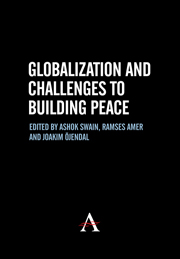Book contents
- Frontmatter
- Contents
- Acknowledgements
- List of Contributors
- 1 Building Peace in the Era of Three Waves
- 2 The Problem of Peace: Understanding the ‘Liberal Peace’
- 3 Pre-emptive Self-defence New Legal Principle or Political Action?
- 4 Beyond Criminal Justice: Promoting the Rule of Law in Post-Conflict Societies
- 5 Peace by Pact: Data on the Implementation of Peace Agreements
- 6 Refugee Repatriation as a Necessary Condition for Peace
- 7 Catapulting Conflicts or Propelling Peace: Diasporas and Civil Wars
- 8 UN Peace Operations as Norm Entrepreneurs: The Challenge of Achieving Communicative Action on Human Rights
- 9 To Practice What They Preach: International Transitional Administrations and the Paradox of Norm Promotion
- 10 Re-examining the Roots of War in West Africa in a Globalizing World
- 11 The African Union (AU) and Its Commitment to Non-Indifference: Can the AU be an Actor for the Promotion of Human Security?
- 12 Hamas Between Sharia Rule and Demo-Islam
- 13 Environmental Scarcity and Intrastate Conflicts: The Case of Nepal
- 14 Narcotics: The New Security Threat for China
- References
- Bibliography
7 - Catapulting Conflicts or Propelling Peace: Diasporas and Civil Wars
Published online by Cambridge University Press: 05 March 2012
- Frontmatter
- Contents
- Acknowledgements
- List of Contributors
- 1 Building Peace in the Era of Three Waves
- 2 The Problem of Peace: Understanding the ‘Liberal Peace’
- 3 Pre-emptive Self-defence New Legal Principle or Political Action?
- 4 Beyond Criminal Justice: Promoting the Rule of Law in Post-Conflict Societies
- 5 Peace by Pact: Data on the Implementation of Peace Agreements
- 6 Refugee Repatriation as a Necessary Condition for Peace
- 7 Catapulting Conflicts or Propelling Peace: Diasporas and Civil Wars
- 8 UN Peace Operations as Norm Entrepreneurs: The Challenge of Achieving Communicative Action on Human Rights
- 9 To Practice What They Preach: International Transitional Administrations and the Paradox of Norm Promotion
- 10 Re-examining the Roots of War in West Africa in a Globalizing World
- 11 The African Union (AU) and Its Commitment to Non-Indifference: Can the AU be an Actor for the Promotion of Human Security?
- 12 Hamas Between Sharia Rule and Demo-Islam
- 13 Environmental Scarcity and Intrastate Conflicts: The Case of Nepal
- 14 Narcotics: The New Security Threat for China
- References
- Bibliography
Summary
Introduction
In research on armed conflict, a debate is emerging over the influence of diasporas on civil wars in their homelands. Many prominent scholars claim that diasporas are especially prone to political extremism and the use of violence to resolve political disputes. In their view, remaining in the homeland and experiencing the atrociousness of war sobers previously idealistic goals of gaining territorial sovereignty or state power and tempers rather than exacerbates tensions between groups. Those who migrate during civil conflicts however avoid the moderating costs of war. While abroad, diasporas are empowered by economic upliftment, and by the freedom to pursue extremist agendas unobstructed by homeland government oversight. Other scholars have challenged these views, offering evidence that diasporas are actively involved in peacebuilding and conflict resolution in their homelands. In this chapter we provide an examination of the arguments offered in support of these opposing claims. In the process, the debate is situated within the broader context of globalization and the challenges and opportunities it presents for building peace. By way of conclusion, we present some of our own reflections on the arguments for viewing diasporas as extremists and/or moderates, and point out some possible directions for future research that would help to bring forward the debate over diasporas and their roles in conflict and peace in the homeland.
Civil War and the Challenge of Building Peace
Armed conflict peaked in the early 1990s as the cold war came to an end in Europe and new states were formed in the aftermath of the collapse of the Soviet Union and Yugoslavia.
- Type
- Chapter
- Information
- Globalization and Challenges to Building Peace , pp. 107 - 120Publisher: Anthem PressPrint publication year: 2007
- 1
- Cited by



